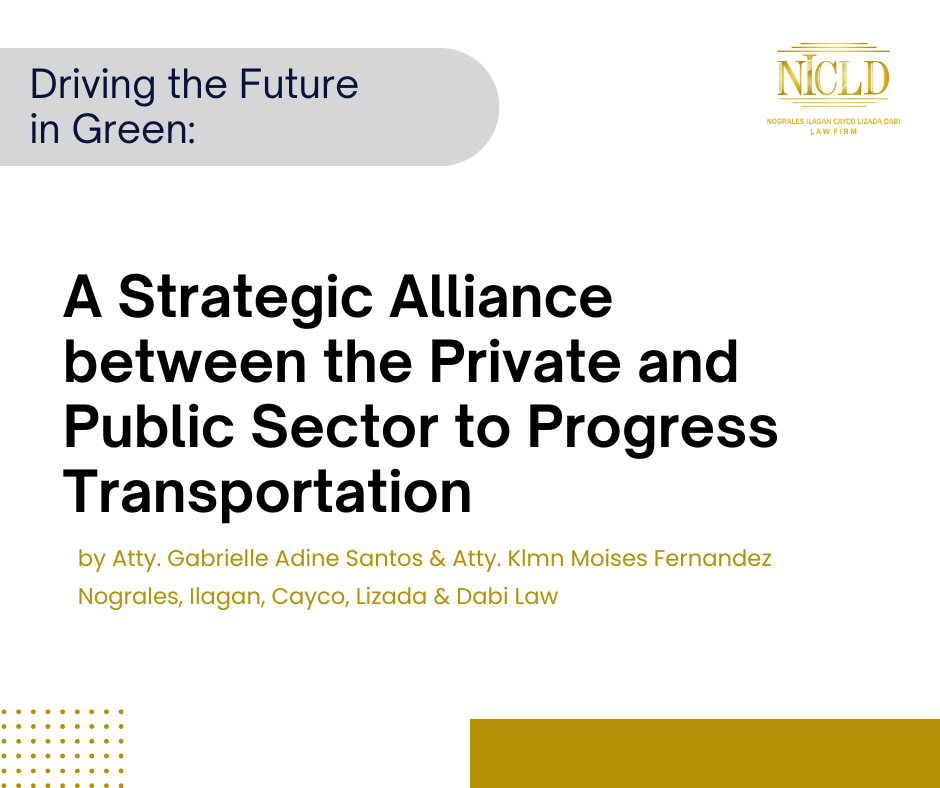In an era where energy security and innovation are at the forefront of global discussions, the Philippines is taking bold steps to transition towards an environmentally sustainable society.
To pioneer this transformation, Republic Act No. 11697, otherwise known as the “Electric Vehicle Industry Development Act” (“EVIDA”) was enacted to develop electric vehicles (“EVs”) as an attractive and feasible mode of transportation to reduce dependence on fossil fuels.[1]
By formulating regulations, the government cultivated an enabling environment not only for the EV industry to thrive, but to remain a permanent fixture for the country’s public transportation and energy infrastructure. To collaborate with the private sector, the EVIDA offers incentives to EV users, manufacturers, and importers.
The EVIDA is not merely theoretical — it is already visible on the ground. A prime example is the launch of Green GSM, the Philippines’ first all-electric taxi service[2]. By leveraging incentives under the EVIDA, Green GSM was able to invest in a fleet of VinFast Nerio Green EVs without the prohibitive costs of importation. These savings were passed on to consumers through affordable, low-cost fares, demonstrating how efficient legislation can directly benefit the public.
Below are some of the key regulations of EVIDA that cater towards green mobility:
- Fiscal Incentives
- Excise Tax Exemption – the importation of completely built units of EVs is exempt from excise tax under the TRAIN Law.[3]
- Motor Vehicle User’s Charge (“MVUC”) Discounts – 30% discount for Battery EVs, and 15% discount for Hybrid EVs are awarded from payment of MVUC, vehicle registration, and inspection fees under the MVUC Act.[4] (Note: [a] and [b] are effective for 8 years [2022-2030])
- Income Tax Holidays (“ITH”) and Enhanced Deductions (“ED”) – EV manufacturers can benefit from 4–7 years of ITH, 5–10 years of ED or Special Corporate Income Tax, depending on location and market orientation.[5]
- Duty and VAT Exemption – The duty exemption on importation of capital equipment, raw materials, spare parts, or accessories, and VAT exemption on imports and VAT zero-rating on local purchases fosters EV investments.[6]
- Non-Fiscal Incentives (Effective for 8 years [2022-2030])
- For EV users
- Priority registration and renewal of registration, and issuance of a special vehicle plate;[7]
- Exemption from the mandatory unified vehicular volume reduction program, number coding scheme, or other schemes;[8]
- Expeditious processing of applications for franchise to operate, including its renewal, for PUV operators exclusively utilizing EVs;[9]
- Availment of training programs on EV assembly, use, maintenance, and repair for employees.[10]
- For EV manufacturers and importers
- For EV users
- Financial Assistance
Clearly, the EVIDA impels progress in both the transportation and environmental spheres. Its success, however, rests on the active participation of all stakeholders — the government, private sector, and the people.
